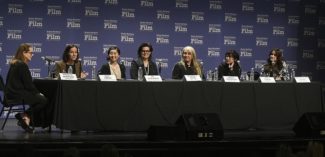The Women’s Panel SBIFF, 2018
Attended by Thomas J Miller at the Santa Barbara International Film Festival, 2018.
The 2018 Women’s Panel introduced 6 distinctive personalities that are at the top of their field in the film industry. The panel included; Lucy Sibbick, 1 part of the 3-member team that did the prosthetic makeup work for Gary Oldman, in The Darkest Hour, Ru Kuwahata, the director of an animated short, titled Negative Space, Tatianna S Riegel, editor for I Tonya, Darla K Anderson, Producer for Pixar’s Coco, April Napier, costume designer for Lady Bird and Elaine McMillion Sheldon, director of the short documentary, Heroin (e)
These women share the honor of having their projects all be Oscar nominations, and all share a common passion of purpose to deliver the absolute best in their craft. The panel was moderated by Madelyn Hammond, a member of the Santa Barbara business world. Madelyn has had the unique status of moderating panels at SBIFF for the past 15 years.
We heard individual stories of how these women got their foot in the door and how that foot has had to learn to dance to multiple assignments all within a single project.
Darla Anderson has worked with Pixar Studios for the past 25 years and has been involved with mega box office successes like: Monsters, Inc and the Toy Story trilogy. The many years and many successes should bring the ability to seamlessly coordinate the parts of each new project, but she tells us, this is never the case. She states she is always thankful for the angels that appear to fix or rescue a misdirected story or theme. Her role as a producer means she is always “all in” on every aspect of the film’s development and production process. Coco took 6 years to make and had a major change in writers after 2 years into the project.
Lucy Sibbick described the painstaking process of helping Gary Oldman get into his Churchill character with a three-hour session of applying and adjusting his facial make-up every day of shooting. Tatianna Riegel explained that she must be involved in the whole filming process, with the director and writers, and look at the early shots as an audience would see them in a theatre. Ru Kuwahata showed us great things can come in small spaces and April Napier emphasized always, Dress for Success!
One of the most interesting stories on the panel was that of Elaine McMillion Sheldon, director of Heroin(e). Elaine grew up in West Virginia, where the story unfolds. She explains the opioid crisis documented in her film, has claimed the lives of many of her high school classmates and emphasizes the overdose rate in Huntington, West Virginia is 10 times the national average. The 3 heroines of the film, take the crisis head on in their community roles of fire chief, judge and missionary to help educate and correct the paths of the addicts, fighting tirelessly to reduce the number of deaths while bringing a firsthand understanding of what communities across the country must do to help bring this epidemic under control.
As I sat through the live presentation it occurred to me that no reference had been made to headline dominated sexual harassment stories throughout the film industry. No mention of #MeToo, or mention of a personal experience that one of these women might have had to overcome. I watched the panel discussion in its entirety again on YouTube and realized, consciously or subconsciously, the choice to leave the discussion out of the panel was the right choice. These women were on stage to discuss the successes that they had achieved, and I believe any turn in discussion to harassment would have sent us down a path that did not fit in the celebration these women were enjoying.
Madelyn kept the energy high and the questions were short and clear. She overindulged, in her own experiences often, but did not let this distract us from the tremendous talent on stage that we were there to see.
About this entry
You’re currently reading “The Women’s Panel SBIFF, 2018,” an entry on Student Film Reviews
- Published:
- 02.20.18 / 7pm
- Category:
- Films, Santa Barbara Film Festival 2018

No comments
Jump to comment form | comments rss [?]